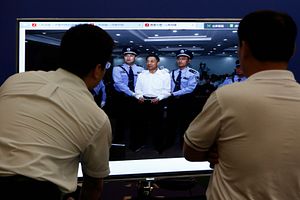It is very rare for an annual plenary session of the Central Commission for Discipline Inspection (CCDI), the nation’s top anti-graft body, to be held two months earlier than usual. Presiding over the meeting last week, Chinese President Xi Jinping vowed to keep up the intensity of his sweeping anti-corruption initiative. The Central Military Commission closely toed the party line the next day, pledging “absolute loyalty” to Xi in beefing up the corruption crackdown.
China Daily subsequently ran an article revealing that former security chief Zhou Yongkang and one-time high-flier Bo Xilai had formed a clique in preparation for “a big game” – hinting that the two had harbored nefarious intentions of trying to topple Xi at some point in his first term.
There are growing indications that Xi’s campaign is not going to die down, yet it is getting “arduous and complicated,” as Xi himself claimed, and of course it is also getting more interesting. It looks almost certain that Xi is now ready to point his cannon at some in the innermost circle of the Chinese Communist Party (CCP) who were once considered “too big to fall.” In 2015, we may well witness a showdown with one or more “super tigers” that could lead to a “defining victory”- a term increasingly used in the state media’s rhetoric.
In the process, cliques and factions affiliated with big bosses, like the Petroleum Gang, the Shanxi Gang, and the Shanghai Gang would crumble one by one. A statement released by the ruling Politburo after its final meeting of 2014 claimed that “organizing cliques within the party to run personal businesses is absolutely not tolerated.”
Obviously, only a few party barons have the power to manipulate cliques that have nationwide influence. Well aware of the danger, graft-busters usually work their way toward the designated target by first going after the associates and allies of those who are the real targets. The cases of Bo Xilai, Zhou Yongkang, and Ling Jihua demonstrate that this way of handling the big sharks works impressively: By the time all the loyalists in their patronage networks are removed, the big tigers have become toothless, ready to be caged.
Nevertheless, Xinhua’s recent article about waging a “protracted war” harkens back to Xi’s recent comment about two “armies” in gridlock within the Party itself, and rightly implies that Xi is facing mountainous challenges. Immense resistance from powerful factions can be expected.
For centuries, relationships have arguably been the most important asset in Chinese officialdom, in which sphere rent-seeking by those who are politically powerful is common practice. Without exception, factionalism – politics in which open or shadowy factions are formed on the basis of personal ties – is a common phenomenon in CCP politics. The Gao-Rao Affair in the early 1950s, in which Xi’s father was deeply embroiled, was viewed by many academics as essentially the outcome of a factional struggle among the ruling elites. Mao Zedong, throughout his revolutionary career, especially in his turbulent later years, never let down his vigilance against any perceived “second headquarters” within the CCP. Ruthless factional struggles in the 1960s-70s during the Cultural Revolution turned Chinese political life into a torrent of treachery, plots and purges. This explains why whenever differences within the CCP leadership emerge, the losers are always accused of “scheming to split the Party.”
It is no secret that party cadres these days are still busy knitting their own relation-nets and forming small trusted circles. Party members who sponsor appointments or who are promoted are beholden to each other. As such, authority is built increasingly frequently through loyalty to an individual rather than to the party.
Factionalism has attracted a great deal of attention, to the extent that it has recently prompted open discussion in the state-run media that rampant corruption owes its existence not only to a few bad apples, but that it is the result of an anachronistic and vulnerable political structure full of loopholes that can be easily exploited by factional interests.
Undoubtedly, the anti-graft campaign launched by Xi after he came to power in late 2012 is the most ambitious of its kind since at least Mao’s rule, and has run longer and gone deeper than any in China’s modern history. By taking down a network of upper-echelon officials, including China’s most prestigious red nobility, Xi is sending a message that no one is beyond his reach.
It is a commonly held consensus in the CCP that rampant corruption threatens the Party’s legitimacy. Success or failure in the war is much more than a victory over corruption; it is a matter of life or death for the CCP in which unity and allegiance are vital for its rule. Xi knows this full well, and is confident that he can rectify the CCP and reclaim its virtue. However, how to fix entrenched factionalism once and for all will prove to be a historic challenge – its concluding chapter yet to be written by Xi. .
Dr. Bob Lee is Director of the Editorial Department, Assistant to the Editor-in-Chief, and Chief Writer of China Daily, Asia Pacific. He has a PhD in political science from the School of Governance, Peking University. The views expressed here are his own and do not represent China Daily.

































